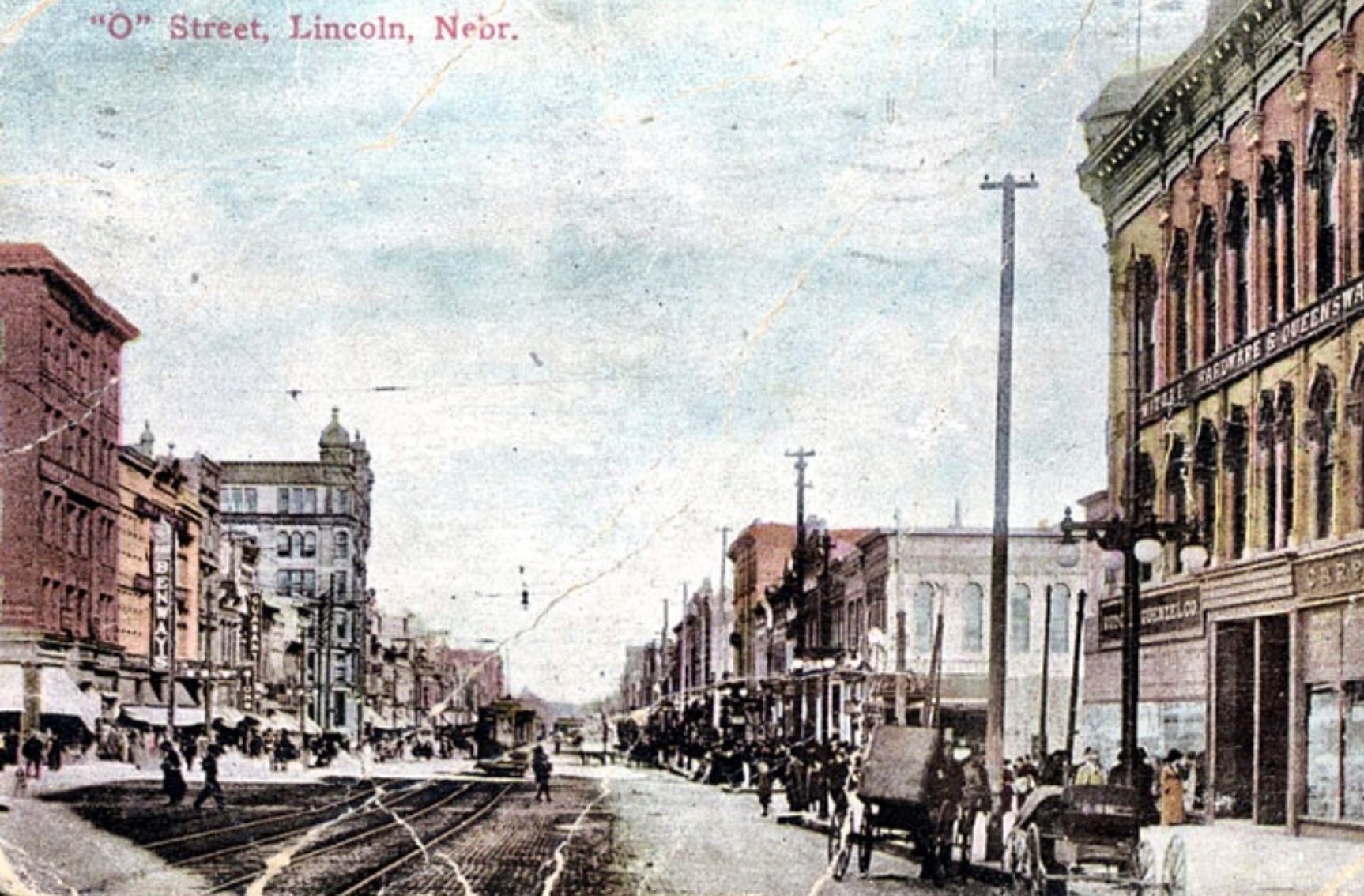
Verifying Wilde's Lecture Venue in Lincoln, NE
Verifying the places where Oscar Wilde lectured is often a tricky business. Take Lincoln, Nebraska for instance.
Most contemporary reports of Wilde's lecture in Lincoln, Nebraska on April 24, 1882 name the location of his lecture as City Hall; but another report says he lectured at the opera house. Neither of these is entirely wrong, but neither alone allows us to be definitive. Let us dig beneath these references to find the true venue.
1) the City Hall
Some accounts of Wilde's lecture tour cite this reference, or its more recent alternative name 'Old City Hall,' the assumption being Lincoln's first City Hall, a building extant at 920 O Street. This building certainly was a 'city hall' in the usual sense of a municipal building. It was completed 1879 as a Post Office and Courthouse, and it later served as the seat of the Lincoln city government for 62 years.
However, on his American tour Wilde typically did not lecture in municipal office buildings, and, besides, City Hall did not house an auditorium.
2) the opera house
This reference would indicate that Wilde's lecture did, in fact, take place in a theater setting. But the lower case is a hint that it was not the main Opera House (formerly Hallo's and later Funke Opera House).
Besides, this listing not only indicates that the Opera House was otherwise engaged on April 24, it also confirms that Wilde lectured at a venue called City Hall. But this listing also adds that the proprietor was a Fred Schmidt, and this piece of evidence helps to resolve the apparent conflict.
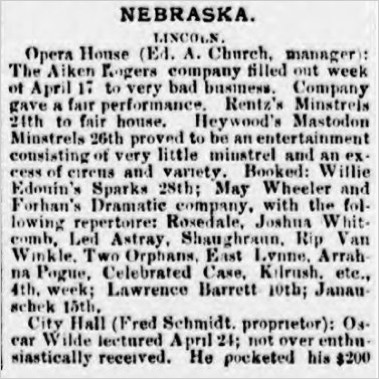
City Hall (upper story theater), c. 1978 905-941 O Street, now 921) Lincoln, NE
The City Hall Theatre
Confusion has arisen because Wilde's lecture took place at a theater that was known only briefly as "City Hall," with the name used in the sense of a music or concert hall, similar to his previous two lectures at Liberty Hall (Lawrence) and Corinthian Hall (Atchison) .
Frederick (Fred) Schmidt, a dry goods merchant, was an early developer in Lincoln, and the longtime owner of premises on O Street built c. 1878 that provided for commercial use on the ground floor, with a two-story height theater on the upper floor. It was here that Wilde lectured.
By 1880, the city directory noted that the building stood on O Street opposite the government post office under the proprietorship of Schmidt and Jones., housing "City Hall, with a seating capacity of 1,000 used for all sorts of public purposes." These activities included dances of The Pleasant Hour Club, and, later, productions of The People's Theatre.
Why Did We Not Know?
The problem for researchers was that the building subsequently extended its commercial activities to both floors, occupants including Schmidt Dry Goods, The Union Pacific Tea Company, Grand Leader Department Store, Simon Galter's Men's Furnishings, and the Golden Eagle Department Store.
The inevitable modifications to the facade that made the structure unrecognizable, also masked its original use for more than a century.
How Did We Find Out?
Fortunately, the building's identity was reestablished in 2010 by Ed Zimmer, Historic Preservation Planner at the Lincoln/Lancaster County Planning Dept.
What happened was that in 2010 a fire destroyed the building. Examination of the remaining structure revealed that the original height of the second floor. Mr Zimmer’s research into the building heritage was largely instrumental in enabling the former City Hall theater to be identified. It is shown opposite in its day a the City hall Theatre where Oscar Wilde lectured.
Related:
Lincoln, Nebraska interactive map
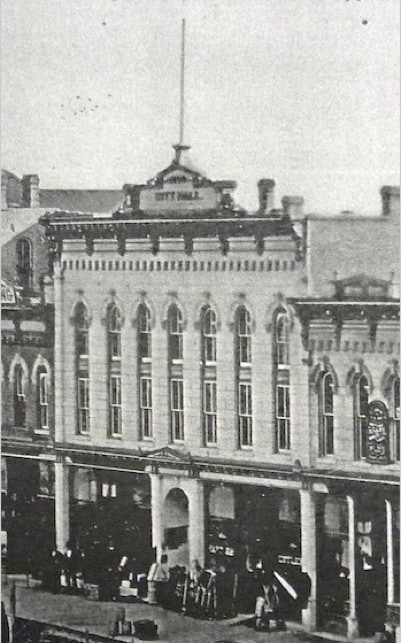
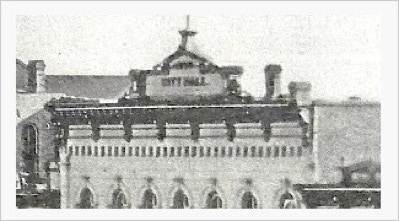
SO, NOT THIS CITY HALL
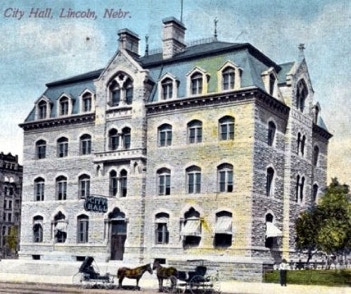
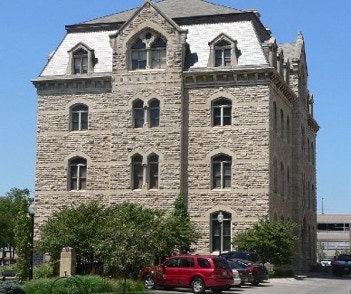
The original "old city hall" in Lincoln, NE.
Then and Now — But not the venue for Wilde's lecture.
WHAT ELLMANN SAID—a note for scholars
The most highly regarded biography of Wilde is the Pulitzer Prize-winning Oscar Wilde (1987) by the American literary critic Richard Ellmann.
While the book insightfully understands Wilde in an impressively elegant scope, it is notoriously flawed its detail owing to its being finalized during the last months of Ellmann's life. The many errors are identified in Horst Schroeder's fine Additions and Corrections to Richard Ellmann's Oscar Wilde (2002).
Ellmann on Lincoln
However, it is worth while to append to Schroeder's list Ellmann's error about the lecture venue in Lincoln, as it is cautionary against composing from manuscript notes and dimming memory—although to be fair to Ellmann, he was writing in a pre-digital age.
Ellmann posits (p. 202): "Wilde lectured at the Presbyterian Road Church in Lincoln..."
His reference is a letter by George E. Woodberry (who had accompanied Wilde around Lincoln) written to Charles Eliot Norton on April 25, 1882, from which Ellmann makes several transcribing errors; e.g. mulberry for mud (also noted by Schroeder), and music for masses.
As for the lecture, what Woodberry actually wrote was that Wilde, "lectured under the auspices of the Presbyterian church." Further, as Ellmann also cites, Woodberry told Wilde that "the nearest I have come to going to church for a long while was in attending your lecture," which surely indicates it was not in an actual church. [1]
For the record, there was (and still is) no 'Presbyterian Road' in Lincoln, where most streets are either numbers or letters. [2]
[1] The Prairie Schooner, Lowry Charles Wimberly, University of Nebraska Press, 1947, Volume 21, p. 113.
[2] In 1882, The First Presbyterian Church, which opened October 9, 1870, was near Eleventh and J streets until moving to larger premises in 1884.